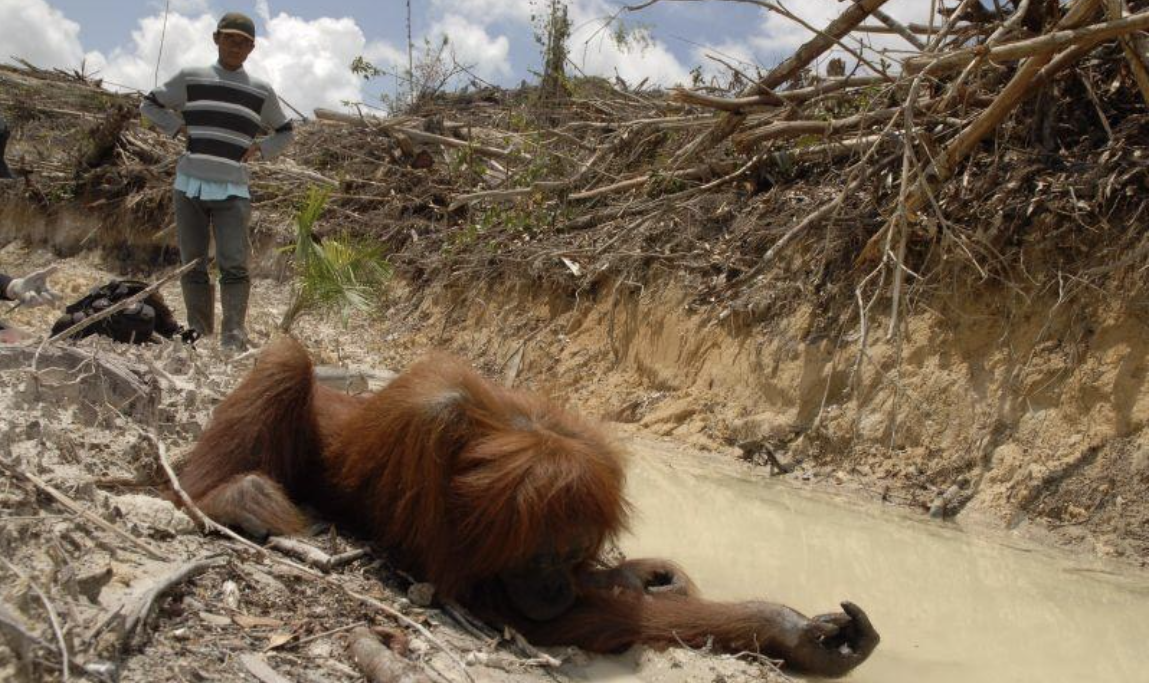OLIVIA AMEZCUA WRITES– When one thinks of Indonesia, palm oil might not be the first thought that comes to mind. Many folks remain vastly unaware of both the country’s near-existential ties with the product— and the self-destructive dangers the palm oil industry imposes on this sprawling nation’s environment.
Palm oil originates from oil palm trees, a crop that grows exclusively in the tropics and is known for its low production cost as well as high yields. While consumers in developing countries primarily use palm oil for cooking, consumers in developed countries will find essential traces of the ingredient in food products, detergents, and cosmetics. In fact, over half of all packaged products consumed in America contain this ingredient.
As global demand for palm oil increases, so does the expansion of plantations which in turn contribute to further mass tropical deforestation. The World Wildlife Fund has categorized the five deadliest impacts of palm oil production: loss of habitat for endangered species, air pollution, soil and water pollution, soil erosion, and the exacerbation of climate change.
Despite such horrifying environmental consequences and a pledge in the Paris Agreement to combat climate change globally, Indonesia is one of three countries that remains steadfast in the palm oil industry and is its leading producer and exporter. Malaysia and Thailand come in second and third. Sadly, Indonesia’s palm oil production accounts for its rank as the world’s fifth biggest emitter of greenhouse gasses due to deforestation and land use.
Moreover, Indonesia has made two recent attempts at strengthening the palm oil industry. First, the country attempted to pressure the UK government to intervene in the matter of a prominent supermarket chain’s decision to cut palm oil from its products. Second, Indonesia lifted export levy rules on palm oil as of December 5th. In reducing the export tax to zero, when domestic prices of CPO (crude palm oil) are at or below $570/mt, the country aims to entice buyers and increase sales.
To top that off, it was just reported that Indonesia plans to build more than 100 coal-fired power plants to expand the production of palm oil for local biofuel consumption and continue expansion of its automobile-centric transportation infrastructure.
Still, we can find solace in the commitment of international activists trying to take down the palm oil industry (specifically targeting Indonesia, due to the large role it plays ). One particular environmental organization that recently took a stand against dirty palm oil, which is produced through unnecessary deforestation rather than a sustainable process, is Greenpeace International. Palm oil is such a massive environmental issue that it fits into the advocacy organization’s platform of eco-consumption and protection as well as preservation of food, forrests, oceans, and oil campaigns.
Recently, members of Greenpeace International set sail on a mission to confront companies involved in producing dirty palm oil while transporting the oil from Indonesia. Activists from Indonesia, Germany, the UK, France, Canada, and the US braved freezing temperatures and harsh waters to follow a tanker ship carrying dirty palm oil for its processing company, Wilmar— reportedly biggest dirty palm oil trader (Asia Media notes: Wilmar claims that it operates in a legal, ethical and sustainable way ).
The activists were caught and held in detention for 33 hours but ultimately succeeded in bringing attention and pressure on the dirty palm oil industry and its partners – like (allegedly) Oreo: “Greenpeace is calling on Mondelez, the maker of Oreo cookies, to drop its major supplier, Wilmar,” the organization said, until it can prove its palm oil comes from producers that are not destroying rain forests or exploiting people.”
Such non-violent protests have successfully persuaded large corporations like Nestlé, Samsung, and TransCanada to choose sustainable and environmentally friendly practices for their products. Recently, members of the Netherlands branch of Greenpeace climbed Wilmar’s same tanker ship, Stolt Tenacity, and hung anti-palm oil signs on its side. They also prevented the ship from docking at Rotterdam harbor, Netherlands – Europe’s largest port.
 What Greenpeace says isn’t so far-fetched: Say NO to palm oil and YES to the environment.
What Greenpeace says isn’t so far-fetched: Say NO to palm oil and YES to the environment.


